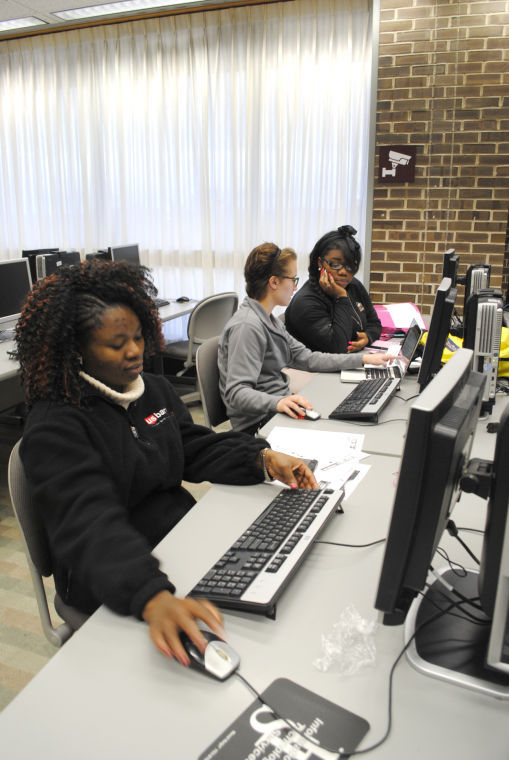Internet vulnerability causes wireless, password problems
Christianah Olojede, junior rehabilitation service major; Megan Taylor, junior rehab counseling major; and Nicoya Parer, senior public health major, work on a group presentation for their counseling class Thursday in the computer lab of Founders Memorial Library.
May 4, 2014
With Internet Explorer being vulnerable to malicious viruses, students are recommended by ITS to use a different Web browser to prevent harm to their computers.
NIU’s Wi-Fi
On an average weekday, NIU has up to 20,000 unique devices connected to the Wi-Fi network, said Cindy Phillips, director of IT Customer Support & Telecommunications Services. On a regular basis, NIU’s Wi-Fi deals with 7,000 to 8,000 concurrent users, Phillips said.
The most common problem brought to ITS by students is password problems with their NIU accounts. Other issues that commonly arise are setting up wireless access on devices and accessing student applications such as MyNIU.
Even with proper fixtures from ITS and ResTech, some students may find their devices unable to connect to the Wi-Fi. Phillips said environmental conditions can cause issues, the network hardware component may have to be corrected or students are in a place where Wi-Fi cannot be accessed.
“ITS was able to install hundreds of new access points in academic and student areas and Housing and Dining installed more access points in the residence halls to increase coverage,” Phillips said.
Even with the new coverage, there will still be small pockets where Wi-Fi cannot be accessible and non-academic space does not have as much coverage, Phillips said.
Internet Explorer virus
Although connecting to Wi-Fi is sometimes a problem, viruses are a bigger threat for computers.
ResTech Helpdesk Manager Latoya Stampley said some students came to ResTech with a particular virus called the FBI Moneypak Virus. This virus is designed to scare PC users into believing the FBI is monitoring their PC by committing a cybercrime.
Over time, if not fixed, this virus can take over a person’s desktop and make it impossible to unlock the compromised computer.
Microsoft issued a patch on May 1 that cleared up the bug that had Internet Explorer vulnerable to viruses and bugs.
On April 26, Microsoft Security Advisory recommended people who use Internet Explorer to use another web browser because of a bug in its coding that allowed viruses to easily penetrate a user’s computer.
Phillipssaid Internet Explorer vulnerability was what is known as a 0-day vulnerability, meaning it was being exploited by malicious users the same day as its announcement. “Malware is ever evolving and just by using your computer, you are involved in some amount of risk,” Phillips said.
Phillips said it should be noted computers are never totally safe. Email accounts are one of the biggest liabilities and Phillips recommends avoiding phishing scams, unknown links or files and responding to unknown mail.
NIU users were not affected by the recent vulnerability, Phillips said.
Junior biology major Lorena Rosiles said she has an anti-virus program in her computer to prevent harm to it.
“I had a friend who had a virus, and pretty much their computer was destroyed because of it,” Rosiles said.







